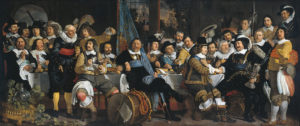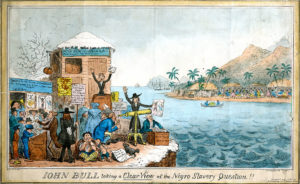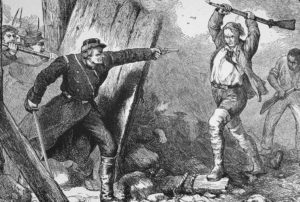When we speak about black history, we tend to conjure up a familiar gallery of intellectuals and freedom fighters. Martin Luther King, Nelson Mandela, Malcolm X, CLR James, Frantz Fanon: the legacies of these leaders are celebrated worldwide. Less well known, in the English-speaking world at least, is Anton De Kom; but he is no less deserving of a place in history.
De Kom is to Suriname what Mandela is to South Africa: a heroic patriot, an advocate of the oppressed, and a symbol of resistance against colonialism. His magnum opus, We Slaves of Suriname — originally written and published in 1934 — was the first history of slavery and Dutch colonialism in Suriname written by a Surinamese man. It was composed while he was exiled to the Netherlands and under surveillance for anti-colonial protests. After its publication, he and it were censored and neglected for years by the Dutch, let alone the West in general.
But then came the Black Lives Matter protests of 2020, and a renewed interest in examining the racial injustices of the past. There has since been a surge of interest in De Kom. Last February, the Dutch government pledged to honour him “with a generous gesture”. He became the first Surinamer to be included in the canon of Dutch history, alongside Vincent van Gogh and Anne Frank. And this month, the first ever English translation of We Slaves of Suriname will be published, 88 years after its completion.
The book is, in part, an ode to De Kom’s homeland: a beautiful, tropical wonderland, teeming with life. But it also tells the history of Suriname, from the beginning of European settlement — which very quickly led to the catastrophic demise of the nation’s aboriginal peoples — to when the Dutch fully colonised it in 1667, turning it into a plantation colony. From this point onwards, thousands of enslaved Africans were imported, to work producing sugar and coffee to export back to the mother country.
For De Kom, slavery was personal. He repeatedly refers to the enslaved as “our fathers and our mothers”, and deftly weaves his own autobiography into the history of Suriname. His father was born a slave, and later became a farmer. He was part of the generation of slaves emancipated into “free” citizenship under Dutch rule, yet haunted by memories still fresh in their minds, and stories passed down by their elders.
Early in the book, De Kom invites “the white reader”, who he believes will be sceptical of what he writes, to contemplate a sailing ship. For De Kom, the image is not one of freedom; it represents instead the torture of his ancestors:
“But we do wish to warn you. From your lofty seat, do not venture down the futtouck shroud … Up here you can smell the invigorating smell of tar and the salt sea wind … Down there it already reeks a mile leeward of the sweat and excrement of a thousand slaves packed into a hold.
Up here you can hear the cries of the albatross, the song of the sailors, and the crash of the wave … Down there you can hear the cries of the slaves, the wails of the women in labour, and the crack of the whip coming down on the backs of blacks.”
When the history of European colonialism is interrogated, the focus tends to be on the British and French (and, to a lesser extent, Spanish) empires. The role of the Netherlands is rarely noted, though it had one of Europe’s oldest empires, including colonies in Suriname, Java and Southern Africa. And, as Pepijn Brandon has argued, the Netherlands was also a key player in the Atlantic slave trade in the 17th and 18th centuries. Dutch planters had a reputation for being especially cruel and sadistic in their treatment of slaves.
The typical colonial narrative argues for the “civilising” influence of the imperial power. De Kom counters this with brutal expositions of what Dutch rule really meant for the Surinamese, documenting gruesome accounts of the torture frequently dished out to those seen as slacking or insubordinate. A common technique was the notorious “Spanish billy goat”, where the slave would be mercilessly flogged while his two hands were tied together, his knees pulled up through the arms with a stick inserted between them and planted onto the ground. The frequent sexual abuse of black women by their masters, long a taboo subject, is also given in-depth treatment by De Kom.
Despite all this, De Kom is uneasily ambivalent towards the end of slavery in Suriname. In 1863, 100,000 or so slaves became free citizens — in name, but not in essence. “The physical instruments of torture,” De Kom lamented, “have largely been replaced by mental torments, poverty and want.” While former slave-owners were compensated for the loss of their “property”, former slaves received no reparations. They weren’t given any land, training, education or credit — unlike European settlers, who had received all these things upon arrival, to help them make a living.
Instead, former slaves had little choice but to enter coolie contracts under “state supervision” for ten years before they could even be officially “free”. It was basically another form of slavery; in other words, the abolition of slavery was managed in the interests of plantation owners, rather than the individuals they’d exploited. It was a sham.
Likewise, Suriname’s “autonomy” was also a sham. The nation was still seen as inseparable from the Dutch kingdom. De Kom’s raison d’etre for writing We Slaves of Suriname was to unshackle his compatriots from their “inherited sense of inferiority and to rouse the self-respect of the Surinamese people” so that they could extricate themselves from the Dutch yoke.
Nevertheless, despite his fervent indictments of the evils of slavery and Dutch colonialism, De Kom was unlike some of his contemporaries, in that he did not subscribe to the “back to Africa” agenda. The decolonisation struggle he envisioned was not meant to be a violent one, or a regression into narrow tribalism: “What I was after was organisation, not a bloodbath.” He firmly believed that the mosaic society of Suriname — composed of blacks, Indians and Javanese — could unite in the spirit of solidarity to liberate their nation, and achieve a dignified human existence for all citizens.
On the last page of his book, De Kom dreamt of the day he would return to a free Suriname:
“Sranang my fatherland.
I hope to see you again once.
On the day when all misery shall be erased from you.”
The lines are particularly poignant if you know that, when he wrote them, he would never see his treasured homeland again. Shortly after the German invasion of Holland in 1940, De Kom joined the Dutch resistance and wrote for the censored De Vonk, a paper affiliated with the Dutch Communist party, which mainly documented the abusive activities of fascist gangs in the streets of The Hague (in particular those against Jews). On the 7th August 1944, he was arrested by Nazi forces and sentenced to forced labour at Neuengamme concentration camp, where he died of tuberculosis and was buried in a mass grave. Ever since, his legacy has risked fading into history.
His work is poignant, too, because Suriname has suffered since then. National independence, like the abolition of slavery, has not been a glowing success. Since 1975, when Dutch rule finally came to an end, Suriname has endured civil war, dictatorships, tribalism and corruption — similar to that which plagues a lot of post-colonial nations. The nation is still haunted by the abuses of empire.
Anton De Kom’s work doesn’t tell an uplifting story, then; but it is a common story, of how our modern world came to be. Black labour, in the form of chattel slavery, played a significant role in creating the wealth of the West. “This is the price we pay for the sugar you eat,” cries out the limbless and nameless Negro slave (owned by a cruel and unscrupulous Dutch merchant) in Voltaire’s Candide. Human beings turned into commodities: this is our history whether we are comfortable with it or not. And De Kom, despite all the efforts to silence him, will not let us forget it.
Disclaimer
Some of the posts we share are controversial and we do not necessarily agree with them in the whole extend. Sometimes we agree with the content or part of it but we do not agree with the narration or language. Nevertheless we find them somehow interesting, valuable and/or informative or we share them, because we strongly believe in freedom of speech, free press and journalism. We strongly encourage you to have a critical approach to all the content, do your own research and analysis to build your own opinion.
We would be glad to have your feedback.
Source: UnHerd Read the original article here: https://unherd.com




